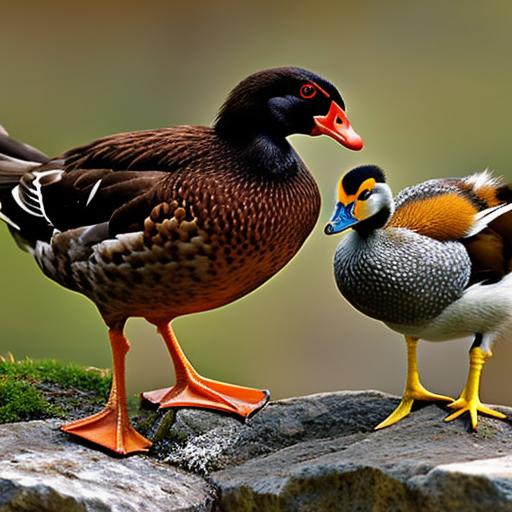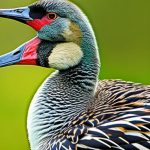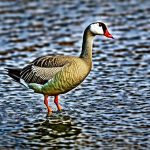Keeping a mixed flock of chickens, ducks, and geese can be a fun and rewarding experience for poultry enthusiasts. Each bird species has unique benefits that can complement each other, making for a more diverse and efficient flock. Chickens are social animals and great egg layers, while ducks are excellent foragers and can help control pests in the garden. Geese, on the other hand, are good at guarding and can provide both meat and eggs. By raising these different bird species together, you can enjoy the benefits of each while creating a harmonious and productive flock.
Key Takeaways
- Raising chickens, ducks, and geese together has many benefits, including pest control and garden maintenance.
- Understanding the differences between these birds is important for providing adequate space and choosing the right breeds.
- Adequate space is crucial for the health and well-being of each bird in a mixed flock.
- Choosing the right breeds for your flock can help prevent aggression and pecking order issues.
- Proper feeding, watering, and hygiene management are essential for maintaining a healthy multi-species flock.
Understanding the Differences Between Chickens, Ducks, and Geese
Chickens are perhaps the most common poultry species kept by backyard farmers. They are social animals that thrive in groups and enjoy the company of their flock mates. Chickens are also excellent egg layers, providing a steady supply of fresh eggs for your family. They come in a variety of breeds, each with its own unique characteristics and egg-laying capabilities.
Ducks, on the other hand, are known for their excellent foraging abilities. They are natural pest controllers and can help keep your garden free from slugs, snails, and other unwanted insects. Ducks also produce delicious eggs that have a richer flavor compared to chicken eggs. They are hardy birds that can adapt well to different climates and environments.
Geese are known for their protective nature and make excellent guard animals. They are highly territorial and will alert you to any potential threats or intruders. Geese can also provide both meat and eggs, making them a valuable addition to your mixed flock. They are hardy birds that can withstand cold temperatures and harsh weather conditions.
The Importance of Providing Adequate Space for Each Bird
One of the most important aspects of raising a mixed flock is providing adequate space for each bird species. Each bird needs enough space to move around and exercise, as well as access to fresh air and sunlight. Overcrowding can lead to stress and health problems, so it’s important to ensure that your coop and outdoor area are spacious enough for all the birds.
Chickens generally require about 4 square feet of indoor space per bird, while ducks need around 6-8 square feet. Geese, being larger birds, need even more space, with at least 10-12 square feet per bird. It’s also important to provide ample outdoor space for your flock to roam and forage. Ducks and geese especially enjoy access to ponds or shallow water for swimming and bathing.
Choosing the Right Breeds for Your Flock
When choosing breeds for your mixed flock, it’s important to consider the climate, available space, and purpose of your flock. Some breeds of chickens are better suited for colder climates, while others thrive in warmer environments. Similarly, certain duck breeds are more adaptable to different climates and can withstand colder temperatures.
It’s also important to research breeds that are compatible with each other. Some chicken breeds may be more aggressive towards ducks or geese, while others may be more docile. It’s best to choose breeds that have similar temperaments and can coexist peacefully in the same flock.
Feeding and Watering Your Mixed Flock
Feeding a mixed flock requires providing a balanced diet for each bird species. Chickens require a diet that is high in protein to support egg production, while ducks and geese need a diet that is higher in fat to support their energy needs. It’s important to provide a mix of commercial poultry feed, fresh fruits and vegetables, and access to forage.
Each bird species also requires access to clean water at all times. Ducks and geese especially enjoy swimming and bathing in water, so it’s important to provide a shallow pool or pond for them to enjoy. Chickens also need access to clean water for drinking and bathing, as it helps keep their feathers clean and healthy.
Managing Health and Hygiene in a Multi-Species Flock

Keeping a mixed flock requires regular monitoring of the birds’ health and hygiene. It’s important to regularly check for signs of illness or injury, such as changes in behavior, loss of appetite, or abnormal droppings. If you notice any signs of illness, it’s important to isolate the affected bird and seek veterinary care if necessary.
Keeping the coop and surrounding area clean and dry is also crucial for maintaining the health of your flock. Regularly remove droppings and soiled bedding from the coop, and provide fresh bedding on a regular basis. This helps prevent the buildup of bacteria and parasites that can cause disease.
Dealing with Aggression and Pecking Order Issues
In any mixed flock, there may be instances of aggression or pecking order issues among the birds. It’s important to establish a clear hierarchy among the birds to minimize aggression and ensure a harmonious flock. This can be done by introducing new birds gradually and providing enough space for each bird to establish its territory.
If you notice any aggressive behavior, it’s important to separate the aggressive bird from the rest of the flock. This can be done by using temporary fencing or creating separate enclosures within the coop or outdoor area. It’s also important to provide plenty of hiding spots and perches for the birds to escape from aggressive individuals.
Tips for Coop Design and Maintenance
When designing a coop for a mixed flock, it’s important to consider the specific needs of each bird species. The coop should be spacious enough to accommodate all the birds comfortably, with enough roosting space and nesting boxes for each chicken. It should also be secure, with sturdy fencing and predator-proofing measures in place.
Regular maintenance of the coop is also crucial for the health and well-being of your flock. Regularly inspect the coop for any damage or signs of wear and tear, and repair or replace any damaged parts. It’s also important to regularly clean the coop and remove any soiled bedding or droppings to prevent the buildup of bacteria and parasites.
The Benefits of Mixed Flocks for Pest Control and Garden Maintenance
One of the major benefits of keeping a mixed flock is their ability to help control pests in the garden. Ducks and geese are natural foragers and can help keep your garden free from slugs, snails, and other unwanted insects. They also enjoy eating weeds and grass, helping to keep your garden tidy and well-maintained.
Chicken manure can also be used as a valuable fertilizer for your garden. It is rich in nutrients that can help improve soil fertility and promote healthy plant growth. By allowing your chickens to free-range in your garden, they can help fertilize the soil naturally while also controlling pests.
The Joys and Challenges of Keeping Chickens, Ducks, and Geese Together
Keeping a mixed flock of chickens, ducks, and geese can be a fun and rewarding experience for poultry enthusiasts. It allows you to enjoy the unique benefits of each bird species while creating a diverse and efficient flock. However, it requires careful planning and management to ensure the health and well-being of each bird species.
Providing adequate space, choosing the right breeds, and managing health and hygiene are all crucial aspects of raising a mixed flock. Dealing with aggression and establishing a clear hierarchy among the birds is also important for maintaining a harmonious flock. By following these guidelines and providing proper care, you can enjoy the joys of keeping a mixed flock while reaping the benefits they bring to your garden and homestead.
If you’re considering keeping chickens, ducks, and geese together, it’s important to understand the dynamics and requirements of each species. While they can coexist harmoniously, there are certain considerations to keep in mind. In a related article on Poultry Wizard, you can find valuable insights on chicken coop interior ideas that cater to the needs of all three species. From creating separate nesting areas for chickens and geese to providing appropriate feed for geese without compromising the nutritional needs of chickens, this article offers practical tips for successfully housing these feathered friends together. To learn more about this topic, check out the article here.
Meet Walter, the feathered-friend fanatic of Florida! Nestled in the sunshine state, Walter struts through life with his feathered companions, clucking his way to happiness. With a coop that’s fancier than a five-star hotel, he’s the Don Juan of the chicken world. When he’s not teaching his hens to do the cha-cha, you’ll find him in a heated debate with his prized rooster, Sir Clucks-a-Lot. Walter’s poultry passion is no yolk; he’s the sunny-side-up guy you never knew you needed in your flock of friends!







